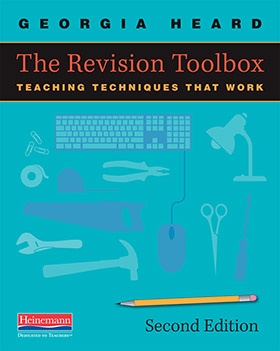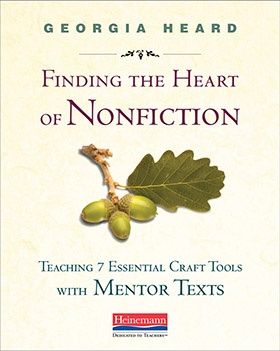Georgia Heard is the treasured author of numerous Heinemann resources. She brings a poet’s ear and a teacher’s eye to teaching writing. This week we published the second edition of her Revision Toolbox; last fall we brought you her Finding the Heart of Nonfiction. Today we’re asking her about her new books. Tomorrow, in part 2, we’ll ask her about her writing life and her teaching life.
In the new-this-week edition of The Revision Toolbox, you write that we need to help kids re-see revision as process not punishment. Where do you think their misperception comes from?
When students write from assigned prompts, write only occasionally, or don’t feel invested in what they’re writing about, revision becomes another task they have to complete rather than something they are motivated to do to make their writing better because it truly matters to them. When we tell a story to a friend, for example, we try to get the details right because we want our friend to understand what we have experienced. Let writing become a vehicle for students to express what they’re passionate about and what they care about. Once they feel fluent as writers, revision won’t seem like a punishment for not getting it “right” the first time.
What do you know now about teaching revision that you didn’t know when you wrote the first edition?
What I know now is similar to what I knew then in that writing and revision are the same process. When I teach writing, I’m really teaching revision. Revision is so hopeful—it’s paying attention to the vision you have and making changes in your writing to achieve that vision. In this new edition, I focus more on nonfiction writing, and I’ve included hands-on sections dealing with strategic conferences, student revision checklists, and structural templates, among many other additions.
Last fall you came out with Finding the Heart of Nonfiction. How would you use it together with The Revision Toolbox?
The two books go hand in hand. In Finding the Heart of Nonfiction I include dozens of craft lessons accompanied by exemplars from all genres. In The Revision Toolbox I show how to extend craft lessons to include revision. For example, if a student is writing a draft, how can he or she try on different points of view to change the voice of the piece or shape a new focus? There is a thin line between teaching craft and revision, and both books touch on each.
You also wrote the classic Awakening the Heart, about teaching poetry. As someone with a poet’s background, what do you love about nonfiction writing?
I’ve always loved nonfiction, and I’ve always felt that nonfiction and poetry share the same love of particulars. In order for a poem to work, the language must be filled with concrete details. Nonfiction is all about details as well. A poem usually has an emotional layer to it, and nonfiction must also exude a passion for and love of the particular.




